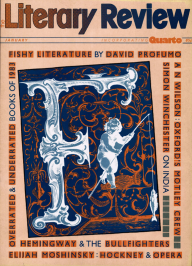Stephen Pickles
Interval Talk
Opera lovers are to opera what rioting football fans are to the Cup Final: an undesirable element. Almost all of them are boring to distraction, bourgeois vultures so utterly sedentary in their theatrical tastes that it is not surprising to hear their unconsidered applause acknowledging the most dreadful performances. An evening at the opera is still regarded as a special treat, something to do whether informed about it or not. Thus it is that the audience presents a bizarre conjunction of total ignorance and programmed knowledge: the young merchant bankers striving to impress some pale English virgin, as if Covent Garden were on the same circuit as Ascot and the fourth of June; old Tory crows, bejewelled as if it were an official reception or exclusive fascist function. The expense of such an evening is something which in itself delights those who associate costliness with quality. It is rarely a proven equation, but they are hardly likely to realise that. To appreciate the amusing foibles of these enthusiasts at play, it is necessary to catch them in the intervals. Rheingold, Salome and Elektra are to be avoided since they have no interval breaks, and consequently afford little of the class-system’s vaudeville. During these serious operas, many of the audience are regretting that they did not pee at the very last minute, and the toilets throng after the Gods have entered Valhalla.
Intervals are when the audience gets its chance to perform.
A: She looks so much fatter as Leonora.
B: It’s the trousers, my dear. They’re all the wrong cut.
A: But in Geneva she was quite a thin Isolde, I thought.
B: Vocally, you mean?
A: Perhaps we were sitting quite far back. That was

Sign Up to our newsletter
Receive free articles, highlights from the archive, news, details of prizes, and much more.@Lit_Review
Follow Literary Review on Twitter
Twitter Feed
It wasn’t until 1825 that Pepys’s diary became available for the first time. How it was eventually decrypted and published is a story of subterfuge and duplicity.
Kate Loveman tells the tale.
Kate Loveman - Publishing Pepys
Kate Loveman: Publishing Pepys
literaryreview.co.uk
Arthur Christopher Benson was a pillar of the Edwardian establishment. He was supremely well connected. As his newly published diaries reveal, he was also riotously indiscreet.
Piers Brendon compares Benson’s journals to others from the 20th century.
Piers Brendon - Land of Dopes & Tories
Piers Brendon: Land of Dopes & Tories - The Benson Diaries: Selections from the Diary of Arthur Christopher Benson by Eamon Duffy & Ronald Hyam (edd)
literaryreview.co.uk
Of the siblings Gwen and Augustus John, it is Augustus who has commanded most attention from collectors and connoisseurs.
Was he really the finer artist, asks Tanya Harrod, or is it time Gwen emerged from her brother’s shadow?
Tanya Harrod - Cut from the Same Canvas
Tanya Harrod: Cut from the Same Canvas - Artists, Siblings, Visionaries: The Lives and Loves of Gwen and Augustus John by Judith Mackrell
literaryreview.co.uk